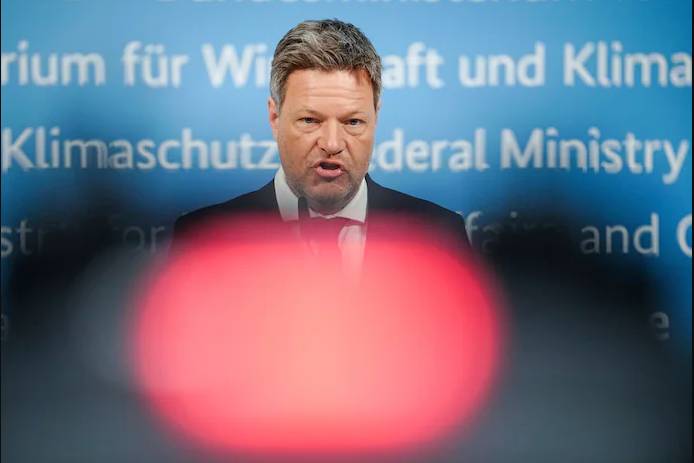BERLIN — The German government on Wednesday took the first step in an emergency plan aimed at preparing for a possible halt to gas deliveries over a dispute with Moscow about payments in rubles.
The plan’s “early warning” phase, initiated by Germany’s Ministry for Economic Affairs and Climate Action, was precautionary. It involved assembling a crisis team to monitor supplies as the government asked businesses and private households to “reduce their consumption as much as possible.” Later phases of the emergency plan, if implemented, could involve rationing gas.
“Security of supply is still guaranteed,” said the economics and climate minister, Robert Habeck of the Green party. “There are currently no supply bottlenecks. Nevertheless, we must step up precautionary measures in order to be prepared in the event of an escalation from Russia.”
The move, which came amid rising gas prices across Europe, shows how the continent’s largest economy is bracing for the potential that the Kremlin could hold back fossil fuels used to heat homes and generate electricity after leaders of the world’s major economies refused to pay for the supplies in the Russian currency.
Russian President Vladimir Putin’s ultimatum about rubles, issued last week to “unfriendly” countries, was rejected Monday by leaders from the Group of Seven major economies, who issued a joint declaration saying the demand represented a breach of contract. Moscow has vowed to resolve by Thursday the practical arrangements necessary for foreign companies to use its currency.
But the Kremlin appeared Wednesday to back away from an immediate threat over payments, with spokesman Dmitry Peskov saying the new rules would not take effect right away “for purely technological reasons.”
Germany’s “early warning” phase, based on a European Union regulation from 2017, means it will deploy a crisis team to monitor gas supplies. Later phases could involve the government removing certain sectors from the grid as it prioritizes households. Germany relies on Russia for about 40 percent of its natural gas, down recently from 55 percent, and 25 percent of its oil, down from 35 percent.
Resorting to emergency mechanisms “signals that Berlin wants to prepare the markets and also put the Kremlin on notice that it’s ready for escalation,” said Franca Wolf, a senior analyst at the Britain-based risk consultancy Verisk Maplecroft. It also shows that Germany, even as it balks at a Europe-wide embargo on Russian energy supplies, “does accept that the current situation is not feasible or sustainable.”
Threats by Russia were prompting other European nations to set deadlines for weaning themselves off supplies from the belligerent country. The question of an immediate embargo has divided the European Union, whose member states buy a quarter of their oil and more than 40 percent of their gas from Russian suppliers.
Klaus Müller, president of Germany’s gas regulator, Bundesnetzagentur, praised Germany’s move. “It is right that the economy minister declared the ‘early warning,’ ” he tweeted. “The aim is to avoid a deterioration in the gas supply for Germany and the E.U. via savings and purchases.” He said the regulator is urging consumers and industry to cooperate and “preparing for all scenarios.”
The government has resisted pressure to preemptively embargo Russian energy supplies, as the United States has done, saying that an immediate end to imports would wreak havoc on the German economy.
The economic outlook is already bleak. A group of economists advising the government on Wednesday lowered its growth forecast for the year. Economic output would expand by 1.8 percent year over last year, instead of 4.6 percent, predicted the German Council of Economic Experts. Even absent a halt to gas supplies, the country’s inflation rate could hit 6.1 percent this year, the experts said, while suspending Russian energy imports would send the rate to between 7.5 and 9 percent.
“Russia’s war of aggression against Ukraine and energy prices are drastically worsening the economic outlook,” they said.
As they raced to find alternative suppliers of the fossil fuels that for decades have flowed from Russia, European governments were seeking to soften the blow for their citizens by slashing taxes and providing subsidies. Wednesday’s request from Germany’s economics and climate ministry that people reduce their consumption stood out because of the absence thus far of large-scale campaigns to encourage behavioral changes in response to the war.
Reinhard Houben, a member of Germany’s Free Democratic Party who sits on the parliament’s economics and climate committee, said relying on Russian energy had proved a “heavy strategic mistake.” He warned of “severe consequences” for German businesses and citizens alike, even without an immediate halt to deliveries.
In neighboring Poland, government leaders sought Wednesday to set an example on energy independence that other European nations could follow.
Polish Prime Minister Mateusz Morawiecki said his country was taking aggressive steps to end its dependence on Russian fossil fuels, including by halting oil imports by the end of the year and cutting itself off from Russian coal as soon as April or May. The commitment to forgoing Russian oil was especially significant, as nearly two-thirds of Poland’s imported crude oil came from Russia last year, according to government estimates. The prime minister said gas would also be part of the government’s “derussification” agenda.
Morawiecki urged other European countries to act alongside Poland and “walk away” from Russian energy supplies. Speaking at an oil refinery outside Warsaw, he said energy payments were funding the “war arsenal” unleashed by Putin, calling Europe’s dependence on Russian supplies “criminal.”




No comments yet
Be the first to share your thoughts!